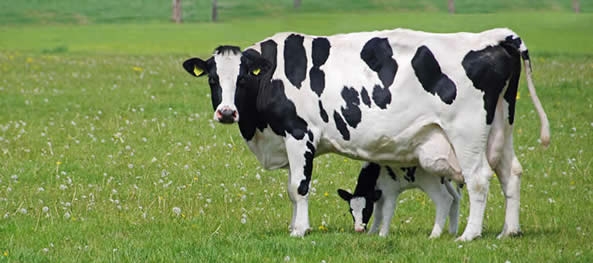
A Manawatu dairy farmer believes he is the only farmer in NZ leaving heifer calves on cows reports The Manawatu Standard.
Jeff Williams and his wife Janice have a farm on No1 Line, near Longburn. They recently hosted a field day looking at the biological farming system they use. Mr Williams said biological agriculture works on organic principles but uses modern science and technology as well. It aims to have healthy soil, which is the basis from which all plants grow, and provide for the wellbeing and sustenance for the cows. About 50 people attended the field day, including dairy farmers, biological agriculture staff and Massey University staff. Mr Williams said he and his wife have 400 cows, of which half calve in spring and half in autumn. This autumn is the first season the Williams’ have kept their replacement heifers, and a few calves being raised for beef, on their mothers.
“It’s not new; our grandfathers used to leave calves on the cows. Why have we been rearing calves with all the extra work? Nature designed the cow to look after her calf. And, so far, it’s working really well. The cows and calves seem happier.” The calves were kept on the cow through until weaning, and the cows were also milked during that time. The few beef calves that were kept were going to a beef rearer in a few days. They had been with their mothers for several days and the beef raisers were happy they were in better health as a result. The field day emphasised to farmers that keeping soil health good was vital for pasture growth. “Farming biologically meant farming sustainably, both environmentally and economically,” Mr Williams said. It meant farmers could shift from being “environmental sinners”, to “environmental saviours”, an Abron biological representative said.
Mr Williams said they changed from conventional dairy farming to biological farming two years ago. From five years ago, cow numbers have dropped by 80. “When we went to a biological system, we saw positive differences in six months, such as more even grazing (fewer clumps in paddocks), a complete reversal of mastitis, and last year we had no losses at calving.” Mr Williams said the dairy industry had become too focused on increasing production, rather than increasing profit. He thought his costs were down by about $1 per kilogram of milk solids as a result of going to a biological system.
We welcome your comments below. If you are not already registered, please register to comment
Remember we welcome robust, respectful and insightful debate. We don't welcome abusive or defamatory comments and will de-register those repeatedly making such comments. Our current comment policy is here.